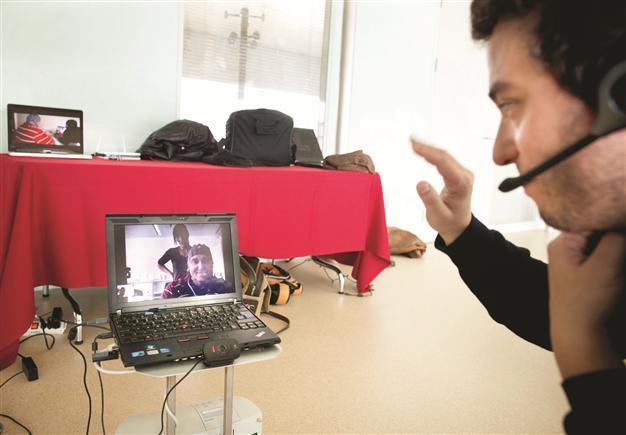Mind-controlled robot a hope for paralyzed people
Switzerland - The Associated Press

A Swiss scientist waves to Mark-Andre Duc, a partially tetraplegic patient. AP photo
Swiss scientists have demonstrated how a partially paralyzed person can control a
robot by thought alone, a step they hope will one day allow immobile people to interact with their surroundings through so-called avatars.
Similar experiments have taken place in the United States and Germany, but they involved either able-bodied patients or invasive
brain implants.
On April 24, a team at Switzerland’s Federal Institute of Technology in Lausanne used only a simple head cap to record the brain signals of Mark-Andre Duc, who was at a hospital in the southern Swiss town of Sion 100 kilometers away.
Duc’s thoughts — or rather, the electrical signals emitted by his brain when he imagined lifting his paralyzed fingers — were decoded almost instantly by a laptop at the hospital. The resulting instructions — left or right — were then transmitted to a foot-tall robot scooting around the Lausanne lab.
Duc lost control of his legs and fingers in a fall and is now considered partially quadriplegic. He said controlling the robot wasn’t hard on a good day.
“But when I’m in pain it becomes more difficult,” he told The Associated Press through a video link screen on a second laptop attached to the robot.
Background noise caused by pain or even a wandering mind has emerged as a major challenge in the research of so-called brain-
computer interfaces since they first began to be tested on humans more than a decade ago, said Jose Millan, who led the Swiss team.
While the human brain is perfectly capable of performing several tasks at once, a paralyzed person would have to focus the entire time they are directing the device.
The robot itself is an advance on a previous project that let patients control an electric wheelchair. By using a robot complete with a camera and screen, users can extend their virtual presence to places that are arduous to reach with a wheelchair, such as an art gallery or a wedding abroad.
health, machine,
